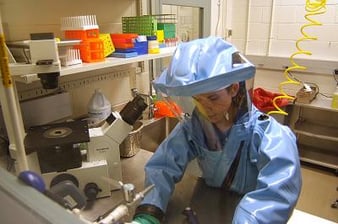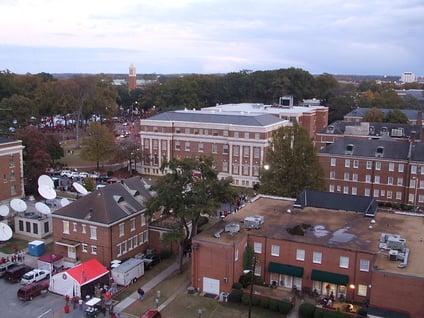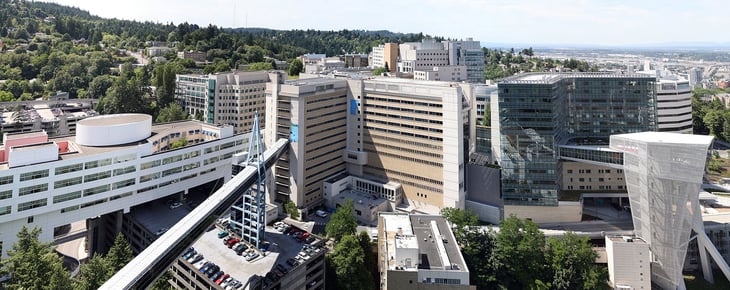Representatives from the University of Arizona, Tucson announced two massive monetary awards this week for researchers in life science disciplines.
Highlighting UA Tucson's Summer achievements though was a $43 million award to support at least five years of disease research, both on the basic science and clinic sides. This record breaking grant from this NIH, the largest in Arizona's history, will likely propel UA's ranking further ahead on the 2016 NIH Life Science Funding statistics list. In 2015, UAZ received a total of $75.5 million.
“This is huge for Arizona. Only four academic medical centers across the country were chosen,” said Elizabeth Calhoun, one of the grant’s principal investigators at the UA’s Arizona Health Sciences Center. “Arizona will now have the ability to partake in the next generation of science in a way that they have never had an ability to do."

(University of Arizona campus, courtesy of Wikimedia Commons)
The second was a $11.4 million, five-year project grant from the National Heart, Lung, and Blood Institute which will fund research into the genetics of acute lung disorders. Dr. Joe "Skip" Garcia, the senior vice president of health sciences at the University of Arizona and principal investigator of this study, received this award through the NIH's highly competitive Project Program Grant which encourages collaborative projects between peers with diverse specialties to catalyze innovative results.
"Coming shortly after the announcement of the largest NIH grant ever awarded in the state of Arizona, this award is another reminder of the strength of the UA Health Sciences and the impact our faculty researchers, clinicians and teachers are creating in our state and around the world." ~UA President Ann Weaver Hart
To learn more about life science research developments and discoveries at the University of Arizona, see the left links featuring recently published UA articles previously published on Science Market Update:
Read More
Tags:
University of Arizona Tucson Research,
AZ,
life science research,
UAZ,
Tucson,
University of Arizona Tucson,
2016
 With the rise of infectious diseases, like the Zika virus and Ebola virus, research centered on these diseases has risen in importance over the last few years. The University of California, Irvine has become a leader in infectious disease research thanks to a prestigious designation by the National Institutes of Health (NIH). The high-containment biosafety level 3 training laboratory (BSL-3) at UC Irvine was recently designated as a National Biosafety & Biocontainment Training Center, making it the third such center in the United States.
With the rise of infectious diseases, like the Zika virus and Ebola virus, research centered on these diseases has risen in importance over the last few years. The University of California, Irvine has become a leader in infectious disease research thanks to a prestigious designation by the National Institutes of Health (NIH). The high-containment biosafety level 3 training laboratory (BSL-3) at UC Irvine was recently designated as a National Biosafety & Biocontainment Training Center, making it the third such center in the United States.
Read More
Tags:
CA,
University of California Irvine,
infectious diseases,
UCI,
UC Irvine,
2016,
BioResearch Product Faire,
Western,
Biosafety Training Center
Rockefeller University is currently experiencing one of the largest phases of research expansion in its modern history. To accommodate for its expanding research capabilities as a competitive institution, Rockefeller University officials have already begun implementing changes to grow the campus and construct new research buildings and institutes all together.
Read More
Tags:
Rockefeller University,
new research building,
New research facilities,
New York,
RockU,
NY,
2016

A team of biochemists at UCLA have created a novel system of converting glucose into highly useful chemical compounds, such as those needed to create biofuels and pharmaceuticals. Previous research endeavors relied on using cells to convert sugar into desired compounds. This has been difficult to achieve because cells would rather use sugar for their own natural uses, such as building proteins and cell walls. The UCLA biochemists have recently developed a way to achieve the conversion of glucose into desired compounds- without using cells.
Read More
Tags:
CA,
University of California Los Angeles,
Los Angeles,
Biochemistry,
chemistry research,
Chemistry,
LAVS,
UCLA,
Biotechnology Vendor Showcase,
2016,
Western,
glucose
New York's Columbia University is nearing the completion of an ambitious building project more than three years in the making. Columbia University Medical Center (CUMC) will open its new state-of-the-art building this August. Work began on this 100,000 square-foot, fourteen-story glass tower in September of 2013 thanks in large part due to a financial gift from Dr. Roy Vagelos and his wife Diana. So it seems fitting that the building will be named the Vagelos Education Center.

(Image Courtesy of Wikimedia Commns & Beraldoleal)
Read More
Tags:
Medical Center,
Biotech Event,
New York,
Columbia University,
East Coast,
Columbia,
Biotechnology Vendor Fair,
NY,
New York City,
Columbia University Medical Center,
new Building,
NYColumbia University,
2016,
Medical equipment
 (Image courtesy of Wikimedia commons)
(Image courtesy of Wikimedia commons)
University of Alabama at Birmingham received a $29 million grant from the National Cancer Institute. This five year core grant will support six research programs at the UAB Comprehensive Cancer Center. The renewal of the Cancer Center Support Grant, the most prestigious federal grant that a cancer research and treatment program can earn, also extends UAB’s elite “comprehensive” designation. According to the UAB News website this designation is awarded for scientific excellence and the ability to integrate diverse research approaches in the fight against cancer.
Read More
Tags:
Bioresearch funding,
cancer research,
Alabama,
University of Alabama,
Cancer Treatment,
Cancer,
University of Alabama Birmingham,
UAlab,
UAB,
University of Alabama at Birmingham,
Cancer Center,
cancer researchers,
fight cancer,
2016,
cancer reserach,
Bioresearch Grant,
Comprehensive Cancer Center
 (Image courtesy of Cacophony via Wikimedia Commons)
(Image courtesy of Cacophony via Wikimedia Commons)
The Knight Cancer Institute at Oregon Health and Science University, a world-leader in cancer research, recently accomplished raising $1 billion in funding to help support the groundbreaking life science research being conducted at the center.
Read More
Tags:
new research building,
Oregon Health and Science University,
Northwest,
cancer research,
OR,
OHSU,
Portland,
2016,
BioResearch Product Faire,
Western,
Knight Cancer Institute
Collaborative research projects across engineering and biomedicine are elevating Michigan State University's status as a top research institution thanks to its newly constructed Bio Engineering Facility.
Read More
Tags:
Michigan State University,
Midwest,
new research building,
Midwest life science marketing events,
Michigan,
MI,
MSU,
new Building,
Midwest Region,
Michigan State,
MSU – MSU,
2016,
BioResearch Product Faire,
bioengineering

The Comprehensive Cancer Center at the University of Michigan, Ann Arbor is one of only 45 comprehensive cancer centers in the United States, and provides cutting-edge cancer research. Researchers from 48 different university departments and 9 schools work together in the cancer center to find answers to some of the toughest questions that scientists face when learning about cancer. The university and Cancer Center will soon be expanding their research capabilities thanks to a generous $17.5 million donation from philanthropists Madeline and Sydney Forbes.
Read More
Tags:
University of Michigan,
Midwest,
cancer research,
Ann Arbor,
MI,
UMich,
new funding,
2016,
BioResearch Product Faire,
Comprehensive Cancer Center,
Forbes Institute for Cancer Discovery,
Madeline and Sidney Forbes



 With the rise of infectious diseases, like the Zika virus and Ebola virus, research centered on these diseases has risen in importance over the last few years. The University of California, Irvine has become a leader in infectious disease research thanks to a prestigious designation by the National Institutes of Health (NIH). The high-containment biosafety level 3 training laboratory (BSL-3) at UC Irvine was recently designated as a
With the rise of infectious diseases, like the Zika virus and Ebola virus, research centered on these diseases has risen in importance over the last few years. The University of California, Irvine has become a leader in infectious disease research thanks to a prestigious designation by the National Institutes of Health (NIH). The high-containment biosafety level 3 training laboratory (BSL-3) at UC Irvine was recently designated as a 

 (Image courtesy of
(Image courtesy of 
